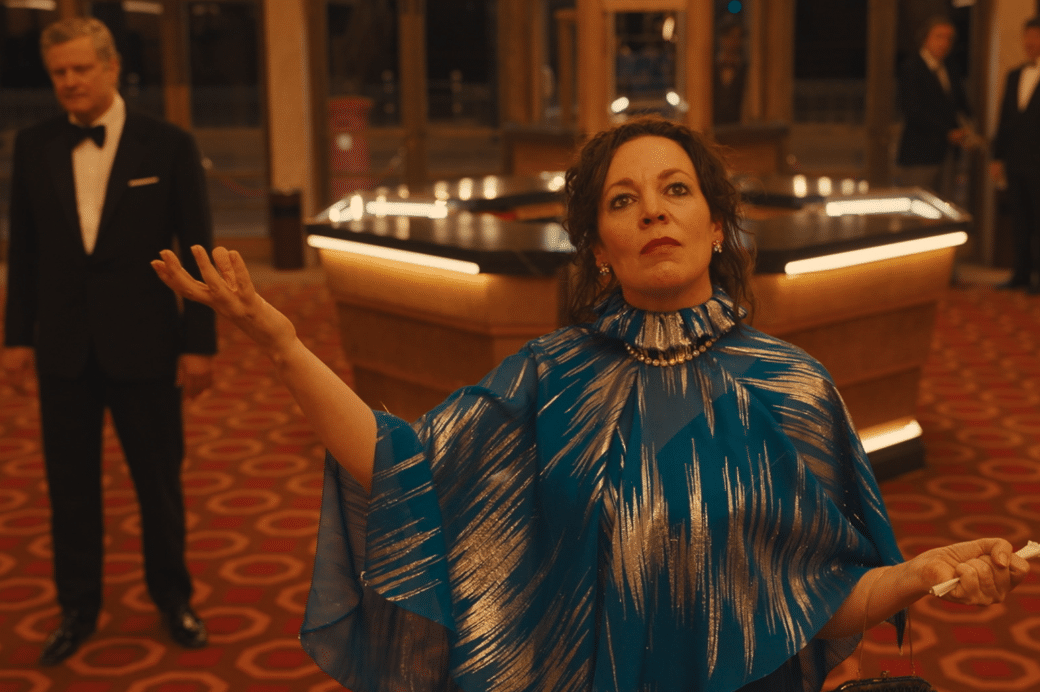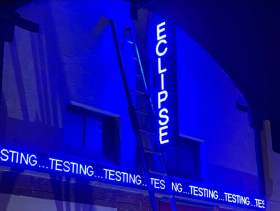Sam Mendes’ war drama 1917 was one of the last big box office hits of the pre-COVID box office. Leveraging its stylistic hook of appearing to be filmed in one single take, it took in nearly $400 million in global ticket sales. It also won three Academy Awards (from ten nominations) and successfully allowed Mendes to emerge out of the looming shadow of two James Bond franchise entries (Skyfall and Spectre).
It’s fitting that his return in 2023 is something much smaller and – like several recent movies from big name international directors – about ‘the magic of the movies’. No doubt the by-product of having time to sit and contemplate the world as cinemas closed down across the world and film productions were halted, cancelled or delayed.
From its rather delicate title to romantic neon-and-fireworks fronted poster, it would appear that Mendes – working from his own solo screenplay for the first time – is going for a nostalgic tone. It’s spikier than that, though. Or it wants to be.
It covers some quite harrowing material (neo-nazis, racism, mental illness) with a darkness that reveals itself once the audience gets past the lovely art deco production design and swooning musical score by Trent Reznor and Atticus Ross. But Mendes unfortunately treats the material and the viewer in an almost coddling sort of way, subduing us with artificially pretty pictures that distract from the very real drama he’s attempting to tell.
Movie magic
It is the early 1980s at the Empire Cinema in Margate, England. It is the sort of venue that for many Australian cinemagoers is a rarity, closer to a venue like Melbourne’s Astor Theatre and the Rivoli, or the Ritz Cinema in Sydney than your standard multiplex.
It’s best days are probably behind it, with hidden parlours and extra cinemas shuttered presumably due to a downturn in ticket sales (although not mentioned, historically VHS was just beginning to boom). The Blues Brothers and All That Jazz posters hang in the lobby.
Duty manager Hilary (Olivia Colman) presides over a staff of younger, cooler kids who rip tickets and sell chocolates to patrons. Hilary is having an affair with her married manager, Donald (Colin Firth), and takes lithium for bipolar disorder.
The arrival of Stephen (Michael Ward, every bit as charming of a screen presence as his character is meant to be) injects Hilary with much-needed excitement. But once Hilary stops taking the medication, her health deteriorates and reaches a dramatic climax at Donald’s much-ballyhooed regional premiere of Chariots of Fire.
With their paths clearly diverging, Hilary and Stephen must navigate the thorny dynamics of what they have built together as they each attempt to breakout of self-destructive cycles.
Pretty as a picture
It’s a pretty damning indictment of Australian distribution that by the time of its March release, Empire of Light’s main selling point appears to be the cinematography of Roger A. Deakins. Despite being what many would flippantly label as ‘Oscar bait’ (time to retire that term: 2023’s Best Picture frontrunner is a sci-fi comedy with sex toys and a predominantly Asian cast, Everything Everywhere All At Once), Deakins is the film’s lone nomination.
It is technically lovely work – all golden and shimmery light, brown tones that evoke the era’s love of wood panelling, and punctuated by occasional 80s neon décor. But it’s far from the year’s best. Among Deakins’ history of 16 (!!!) nominations and two wins, it easily ranks as probably his least interesting.
If anything, it is probably the production design of Mark Tildesley that deserved the awards attention, restoring a rather plain building on the Isle of Thanet in Kent, into a dreamy cinematic palace.
But herein lies the problem with Empire of Light. It’s beautiful, yes, but should it be? Is it too beautiful?
We are unfortunately far from the days when filmmakers like Stephen Frears would bring tantalising edge to the very contemporary concerns of Thatcher-era England in Prick Up Your Ears and My Beautiful Laundrette. Or when Derek Jarman injected punk into the monarchist rule of Jubilee. Even something like Stephen Daldry’s Billy Elliot, a populist hit that nonetheless felt accurate to its setting. Mendes’ film comes across far too polished. Too vanished.
The recent Amazon Prime original drama, My Policeman, starring pop icon Harry Styles, faced a similar conundrum. How can you make a movie about ordinary working-class people who’ve lived by the British seashore all their lives yet whom look as if they have just come from a spa retreat at some ski chalet across the channel?
Perfect, porcelain skin and clothes without a single frayed hem. It’s all too perfect and it ultimately does Mendes’ film in. Colman gets a bit of frizz in her hair and a smudge to her makeup, but never looks like she’s actually struggling. Colman gives a good performance here, but she can only elevate the hum-drum material so much. She and Ward are let down by a film that is more interested in aesthetics than authenticity.
By the time Colman’s Hilary finally sits down to watch a movie in the theatre she has helped operate for many years, the power of cinema has dimmed to something far more modest. There is something wonderful about a story of two souls painfully self-identified as outcasts finding one another, but Mendes suffocates it by lacquering it in thick amber.
A love letter to cinema, written by an imaginary friend.
Empire of Light is in Australian cinemas from 2 March 2023.
Actors:
Director:
Format: Movie
Country:
Release:





